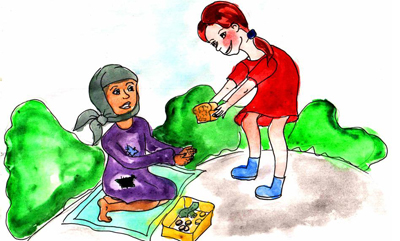One day late in the fall my friend and I were at the vegetable
market because my mother had asked me to buy some vegetables
for dinner. Suddenly we saw a girl who was sitting on the cold
dirty sidewalk. She was dressed in a light shabby dress even
though it was rather cold. She was begging for money. There are
a lot Kurds in our Southern city nowadays who migrated here
after the military actions in the north of Iraq. I was very sorry for
the girl and decided to help her. I asked my friend to wait a little
but she didn’t want to listen, saying that there were lots of beggars at the market and I wouldn’t be able to help everybody.
Still I asked her to stop for a minute to talk to the girl.
Get the Flash Player to see this player.
“Hi, why are you sitting here?”
“My mother is ill and we have nothing to eat.”
“Where are you from?”
“I’m from Iraq. When the army attacked our village my
father was killed, but my mother and my three sisters left the
village and went first to Azerbaijan and then to Dagestan.”
“How do you live here?”
“We haven’t got money to live on so I have to beg.”

I went to the nearest shop, bought two loaves of bread and
gave them to the girl. She was very grateful. Two loaves of
bread are not enough to make their living but if all of us are merciful and do good deeds, life will be better for everybody. Goodness opens people’s hearts.
Exercises
I. Understanding the Story
What do you think is the main idea in this story?
1. Begging is wrong.
2. The people of Dagestan are rich.
3. We should be kind to others in need.
II. Vocabulary
With a partner, explain each of these words.
1. sidewalk
2. shabby
3. migrated
4. beggars
5. grateful
III. Now you Talk
1. Describe what shabby clothes look like.
2. What is this Kurdish family’s problem and why?
3. Why does the other girl refuse to help the Kurdish girl?
IV. Now you Write
1. Your attitude toward beggars and begging.
2. Write about a time when you or your parents were asked for
money.
3. Write about the difficulties for people caught in a war.
V. Role Play
1. Two girls: Talking about whether they will help the beggar.
2. The writer and the Kurdish girl: They talk about the Kurdish
girl’s situation.
3. The writer and her mother: They talk about the author giving
money to the girl.
4. The friend and her brother: The friend complains about the
beggar.
5. The writer and the shop owner: They talk about buying food
for the poor. |

